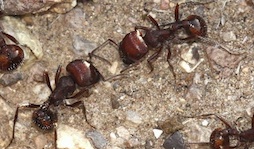The Gordon Lab


Gordon. The evolution of the algorithms for collective behavior
Gordon. The ecology of collective behavior
iBio research talk: The Evolution of Collective Behavior
Gordon. Natural selection on collective foraging behavior
Gordon. The fusion of ecology and behavioral ecology
Gordon. Trail networks of turtle ants
Gordon. The dynamics of foraging trails in the tropical arboreal ant Cephalotes goniodontus
Esponda and Gordon. Distributed nestmate recognition in ants
Sturgis and Gordon. Which ants fight
Gordon. From division of labor to collective behavior
Anternet: The regulation of ant colony foraging activity without spatial information
Davidson et al. Harvester ants as leaky integrators
Davidson and Gordon. Spatial patterns of interaction
Ingram, et al. Colony life history and lifetime reproductive success of red harvester ant colonies
Friedman and Gordon. Ant genetics: reproductive physiology, worker morphology, and behavior
Ingram, et al. Foraging gene expression
Pringle, E. et al. Water stress strengthens mutualism among ants, trees, and scale insects
Vonshak and Gordon. Intermediate disturbance promotes invasive ant abundance